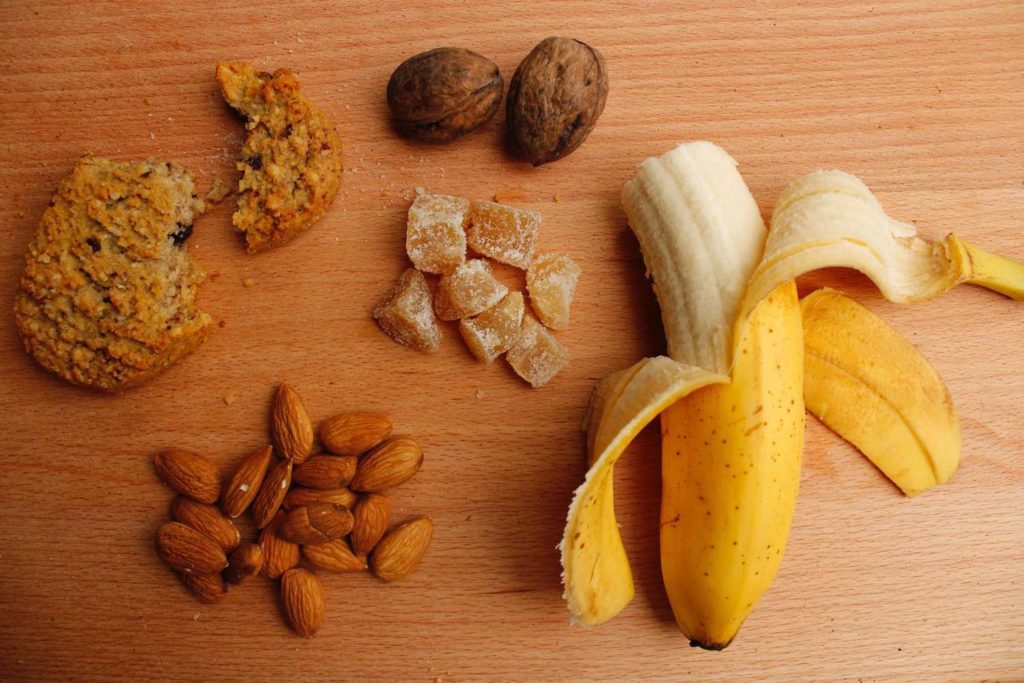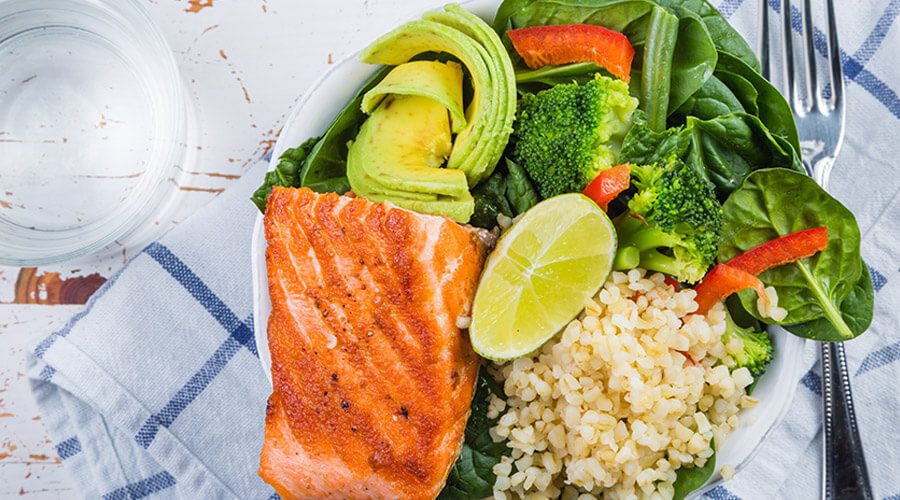By Michelle Shapiro and Nicki Parlitsis | Read Time: 7 Minutes
Can you lower anxiety using nutrition? Yes! Read on for ways to use nutrition & lifestyle in a bottom-up approach to combat symptoms of anxiety. (As opposed to a conventional top-down approach using only psychological interventions).
There can be a feedback loop in which the mental symptoms of anxiety amplify the physical symptoms and vice-versa. This is why addressing both the mental components and the physical can be critical in reducing chronic anxiety symptoms.
(e.g. Anxiety causing GI distress, and chronic GI distress causing anxiety.)

What is blood sugar and how does it work?
Glucose, or blood sugar, is the primary source of fuel for the body. One of the main ways your body produces glucose is by breaking down the carbohydrates we eat (carbohydrates are found in many different types of foods).
After eating something with carbohydrates, the body breaks them down into their simplest form (glucose) and transports them in the bloodstream to tissues so for immediate energy use or storage for later.
There’s a normal rise in blood sugar with this process, as glucose enters the bloodstream. As sugar starts to leave the blood and move into cells and tissues, there is a natural decrease in blood sugar.
The speed at which blood sugar rises and falls depends on many different factors, and can either be gradual or dramatic. The faster we digest carbs, the faster our blood sugar rises.
How is blood sugar related to anxiety?
The link between anxiety and blood sugar has been confirmed in over 300 studies. Poor regulation of blood sugar can cause similar symptoms to mental health issues such as anxiety and irritability.
You know that “hangry” feeling when you haven’t eaten in a long time and your blood sugar is too low? It might come with physical symptoms like feeling shaky, lightheaded, dizzy, and irritable. Very similar to anxiety!
Fortunately, management of both anxiety and blood sugar have similar dietary strategies.

Types of Carbohydrates
There is NO reason to fear carbs! Carbs are essential for our body to produce enough energy to fuel us throughout the day. The important thing to focus on is the right types in the right quantities.
Simple carbohydrates are broken down into glucose very quickly by the body and are available as an immediate source of energy. They create a quick and marked rise in blood sugar.
(Think: processed and refined flours, table sugar, instant oats, fruits, etc.)
This does not mean that fruit is bad! Simple carbs can be incredibly useful for times when we need an immediate energy source, like having a banana right before a workout. If we’re sitting at a desk for the next 3 hours doing work, though, this might be a time where we want to focus on keeping that rise in blood sugar more gradual to avoid a subsequent drop afterward (think: a “sugar rush” from a piece of cake followed by a “crash”).
Complex carbohydrates are broken down into glucose much slower by the body, since they are more complex molecules. They also have more fiber, which further slows down the rate of absorption. This results in a more gradual rise in blood sugar and more stable levels overall.
(Think: whole and minimally processed grains, vegetables, beans, peas, steel cut oats)
6 Ways to Lower Anxiety by Managing Blood Sugar
Here are some tools we can use to minimize spikes, and subsequent drops, in blood sugar levels throughout the day, which can improve mood and reduce anxiety symptoms.
1. Reduce sugar intake
Try to minimize the amounts of added sugar you eat on a daily basis. It’s surprising how many foods add extra sugar without us even realizing! Common culprits of added sugar include yogurt, oatmeal packets, ketchup, sauces, flavored coffees, soft drinks, snack bars, bread, and more.
See if you can swap out some of these items with lower sugar alternatives to keep total added sugar intake < 35g per day (all foods now list “added sugars” on the nutrition facts label).
2. Pair carbs with protein and/or fat
Since protein and fat take longer to digest, when we pair them with carbohydrates they slow down the absorption of glucose (sugar) into the bloodstream. This results in more stable blood sugar and energy levels throughout the day.
Example of balanced snacks: Fruit w/ nuts; Oatmeal w/ greek yogurt & nut butter; Crackers w/ tuna or hard boiled egg.
3. Choose foods with fiber
Choose complex carbohydrates with fiber, such as whole grains (oats, quinoa, farro, barley).
Aim for 25-35 grams of fiber per day, making sure to drink adequate water (½ body weight in ounces) along with the fiber to avoid GI distress.

4. Eat consistently throughout the day
Skipping meals and going long periods without eating can affect our blood sugar, mood, and mental health. Aim to have a meal or snack every 3-4 hours that includes protein, healthy fat, and fiber.
Notice how you feel when this eating pattern is affected. It might be helpful to plan ahead by packing a lunchbox for work, or keeping healthy snacks around to hold you over before your next meal.
5. Manage stress levels
Stress is our body’s fight-or-flight response. On a primal level, our bodies want to maximize our ability to fight or flee when presented with a threat.
This results in an increase in stress hormones (e.g. cortisol, adrenaline) and the glucose moves into the bloodstream for an immediate energy source.
However, if we feel stress while sitting at a desk, this sugar stays in the blood and can result in health issues over time.
6. Go for a walk
Even just a 2-5 minute walk after each meal can help control blood sugar levels. Make it a habit to get moving after mealtimes, whether that means waking up earlier to add a short walk after breakfast, taking a stroll on your lunch break, or taking a walk with the family after dinner.
Bottom line
Large fluctuations in blood sugar affects both our physical symptoms and mood. To prioritize mental health, reduce sugar consumption and choose foods with fiber, healthy fat, and protein every 3-4 hours throughout the day.
Incorporating even small amounts of movement throughout the day is helpful to manage blood sugar and stress levels.
Working with a practitioner who helps you address the root cause of your high cholesterol while maintaining a diet and lifestyle that helps to support your liver detoxification pathways, can help to keep your heart healthy.
Do you want to lower anxiety in a more natural and sustainable way?
By working with one of our Registered Dietitian Nutritionists at Michelle Shapiro Nutrition LLC, you will receive personalized recommendations and one-on-one nutritional counseling to help you reach attainable goals in a way that fits your lifestyle.
If you want a more self-paced approach to reducing anxiety naturally, you can join our online program Anxiety Proof for step-by-step lessons at your own pace!
[…] carbs and blood sugar, from the basics to the nitty gritty. You’ll find tangible strategies for how to balance your blood sugar and find your carb “sweet […]